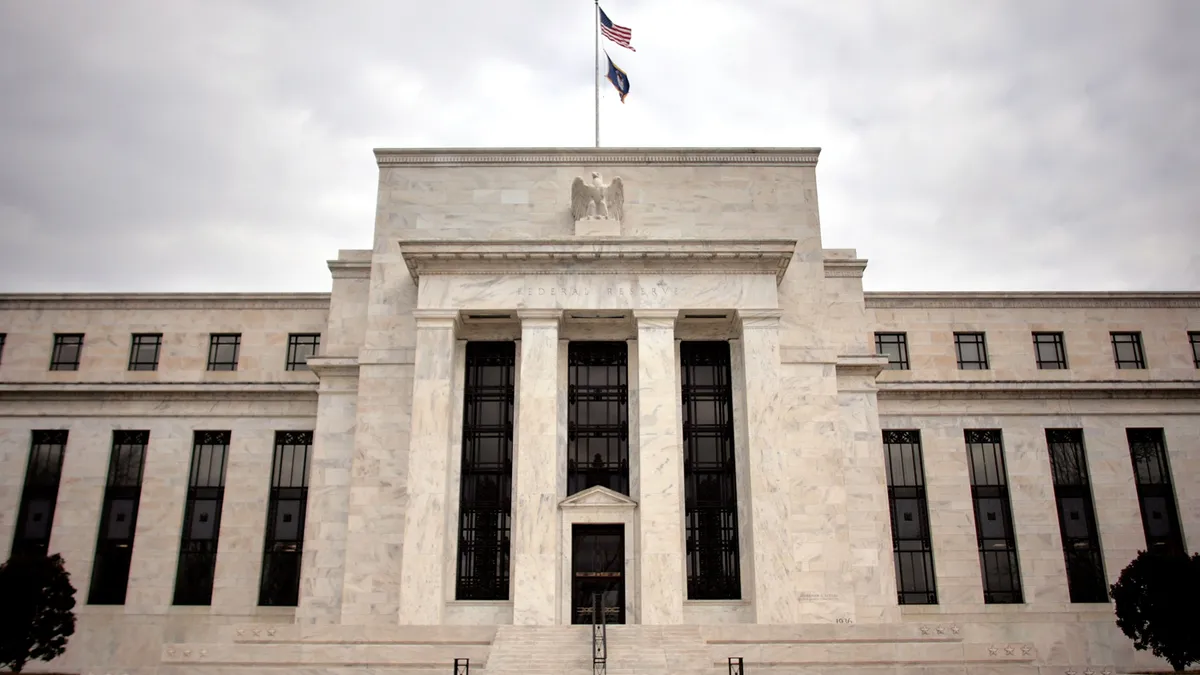Dive Brief:
- The Senate confirmed economist Philip Jefferson to the Federal Reserve Board of Governors on Wednesday by a 91-7 vote, marking the first time two Black people have served on the seven-seat board simultaneously. (The Senate confirmed Lisa Cook, the Fed board’s first Black woman governor, a day earlier.).
- A Senate vote on Jerome Powell’s renomination as Fed chair is expected Thursday afternoon.
- Jefferson’s confirmation leaves one seat open on the Fed board. Senate Banking Committee Chair Sherrod Brown, D-OH, told Bloomberg his panel intends to hold a hearing May 19 for Michael Barr, the former Treasury Department official President Joe Biden has nominated to become the Fed’s vice chair for supervision.
Dive Insight:
With Wednesday’s confirmation, Jefferson begins a term at the central bank that runs until 2036 and becomes the fourth Black man to serve on the Fed board.
“Dr. Jefferson is one of the country’s leading thinkers on the economics of poverty and will be a critical voice on the Fed,” Brown said in a statement Wednesday. “I look forward to working with Dr. Jefferson and the entire Federal Reserve Board to tackle inflation and create an economy that works for everyone.”
Much of Jefferson’s work has focused on labor markets and poverty — particularly, economic instability faced by Black families and women-led households. He urged the central bank, in a 2018 interview published by the Minneapolis Fed to be wary of the varying toll of monetary policy across demographic groups.
“We should be aware of asymmetric or disproportionate effects because that knowledge allows us to re-evaluate a policy that we might otherwise do without such considerations,” he said, according to The Wall Street Journal.
Jefferson’s road to confirmation was much less contentious than Cook’s. While Democrats needed Vice President Kamala Harris on Tuesday to break a 50-50 partisan deadlock on Cook, Jefferson’s ascent to the Fed board appeared well in hand months ago.
He was the only Fed nominee (among four, including two sitting Fed governors) to get unanimous support in March from the 24 members of the Senate Banking Committee.
At a February nomination hearing that featured both Jefferson and Cook, Republicans repeatedly challenged Cook’s experience level with monetary policy. Sen. Bill Hagerty, R-TN, for one, said Cook’s academic background — with its emphasis on the cost of racial disparities — “doesn’t seem related to the mission of the Federal Reserve.”
Jefferson didn’t encounter the same pushback but has a long history with the Fed. He began his career as a research assistant for the central bank’s board from 1983 to 1985. He returned to the Fed in 1996 as an economist in the central bank’s monetary affairs division but has spent the past 25 years in academia, teaching economics at Swarthmore College in Pennsylvania and most recently serving as vice president for academic affairs at North Carolina’s Davidson College.
In his opening months on the Fed board, Jefferson will be asked to help stem inflation, which has sent consumer prices up 8.3% in the year through April, according to data released Wednesday.
The Fed approved a half-percentage-point interest rate increase last week — the second bump in two months — and indicated two further upward adjustments were likely in June and July.
“The spike in inflation we are seeing today threatens to heighten expectations of future inflation,” Jefferson said during his nomination hearing. “The Federal Reserve must remain attentive to this risk and ensure that inflation declines to levels consistent with its goals.”













